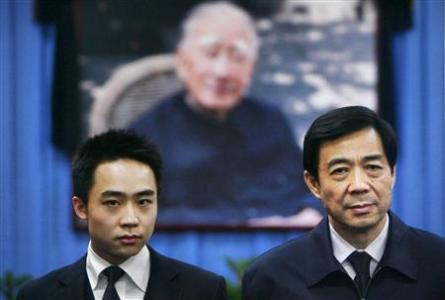(Reuters) – The Harvard-educated son of disgraced Chinese political leader Bo Xilai defended his father against charges of taking bribes and having improper sexual relationships, saying he believed in his father’s good character.

“Personally, it is hard for me to believe the allegations that were announced against my father, because they contradict everything I have come to know about him throughout my life,” Bo Guagua said in a statement posted on the microblog site Tumblr.
“Although the policies my father enacted are open to debate, the father I know is upright in his beliefs and devoted to duty,” he added. Bo confirmed the statement, posted on Saturday, with Reuters.
Since graduating from Harvard University in May with a master’s degree in public policy, Guagua, 24, has kept a low profile, in contrast to reports earlier this year of a playboy lifestyle in the United States that created a firestorm on the Internet back in China.
The younger Bo’s statement came a day after China’s ruling Communist Party accused his father of abusing his power, taking huge bribes and other crimes.
Bo will be handed over for criminal investigation, state media reported on the latest phase in a scandal of murder and cover-ups that has shaken China’s leadership. Bo had been seen as a strong contender to become a member of the powerful Standing Committee of the Chinese Communist Party Political Bureau later this year.
Bo’s wife, Gu Kailai, and his former police chief, Wang Lijun, have both been jailed over the scandal stemming from the murder of British businessman Neil Heywood in the southwestern city of Chongqing, where Bo was Communist Party chief.
At her trial on August 9, Gu admitted to poisoning Heywood last November.
Gu and Heywood got into a dispute over a soured real estate deal, according to the official Xinhua news agency. Gu said she believed Heywood threatened Guagua’s personal safety.
“I suffered a mental breakdown after learning that my son was in jeopardy,” Gu said, according to official accounts.
Last week’s government statement carried by Xinhua said that in the murder scandal, Bo “abused his powers of office, committed serious errors and bears a major responsibility”.
Bo has been expelled from the party as well as the elite decision-making Politburo and Central Committee.
ONLY CHILD
Guagua is the only child of Bo and Gu. Though his friends and acquaintances say he would like to challenge the negative perception of his parents more forcefully, Guagua has said very little publicly because he fears it could only make matters worse.
“He has always taught me to be my own person and to have concern for causes greater than ourselves,” Guagua said in his statement. “I have tried to follow his advice. At this point, I expect the legal process to follow its normal course, and I will await the result.”
This past summer Guagua traveled along the Maine coast and visited Westchester County in New York, according to friends and acquaintances. He has been somewhat isolated, though, as he takes stock of his uncertain future. Friends said Guagua has had little or no communication with his mother since March, shortly before she was accused of murder. Communication with his father has been intermittent at best, they said.
Several friends and acquaintances interviewed said they did not want their names used because they fear fallout from being associated with the biggest scandal in Chinese politics in more than two decades.
“The whole thing is just radioactive,” one of Guagua’s friends told Reuters. “He’s under tremendous pressure.”
In private, Guagua, who declined to comment for this story, has told friends his father did not flirt with the extremism exhibited by Mao Zedong during China’s 1966-76 Cultural Revolution.
According to Guagua’s accounts to friends, Bo Xilai encouraged the singing of so-called red songs, but only as a means to promote unity and morality in Chongqing, a sprawling municipal district of about 30 million people that is wracked with street crime and other forms of corruption.
Bo Xilai promoted the reading of Maoist poems, but he also referenced the works of Thomas Jefferson, friends said, relating conversations with Guagua.
In August, Guagua bristled at the suggestion that his father may have given him documents as a sort of insurance policy against his enemies in the Communist Party.
“My father has no need for any such things because he has always been aboveboard, regardless of how people who don’t know him can speculate,” he said in an email exchange with Reuters.
(Editing by Jackie Frank)





